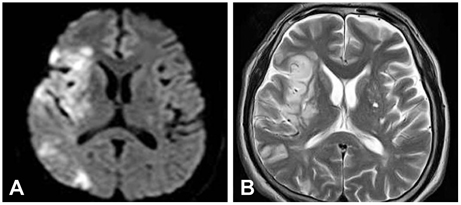Korean Circ J.
2011 Sep;41(9):546-548. 10.4070/kcj.2011.41.9.546.
Acute Cerebral Infarction Following Intravenous Glycoprotein IIb/IIIa Inhibitor for Acute Myocardial Infarction
- Affiliations
-
- 1Department of Cardiology, Konkuk University School of Medicine, Chungju Hospital, Chungju, Korea. gilll@paran.com
- 2Department of Neurology, Konkuk University School of Medicine, Chungju Hospital, Chungju, Korea.
- KMID: 2094108
- DOI: http://doi.org/10.4070/kcj.2011.41.9.546
Abstract
- Stroke is a rare but serious complication of acute myocardial infarction (AMI). Currently, glycoprotein (GP) IIb/IIIa inhibitor is used in clinical practice for acute coronary syndromes and percutaneous coronary interventions (PCIs). The incidence of stroke in patients receiving GP IIb/IIIa inhibitor during PCIs is very low. We report the case of a 47-year-old man who presented with AMI and suffered an acute cerebral infarction after infusion of a GP IIb/IIIa inhibitor following primary PCI.
MeSH Terms
Figure
Reference
-
1. Hess DC, D'Cruz IA, Adams RJ, Nichols FT 3rd. Coronary artery disease, myocardial infarction, and brain embolism. Neurol Clin. 1993. 11:399–417.2. Komrad MS, Coffey CE, Coffey KS, McKinnis R, Massey EW, Califf RM. Myocardial infarction and stroke. Neurology. 1984. 34:1403–1409.3. Akkerhuis KM, Deckers JW, Lincoff AM, et al. Risk of stroke associated with abciximab among patients undergoing percutaneous coronary intervention. JAMA. 2001. 286:78–82.4. Mooe T, Olofsson BO, Stegmayr B, Eriksson P. Ischemic stroke: impact of a recent myocardial infarction. Stroke. 1999. 30:997–1001.5. Behar S, Tanne D, Abinader E, et al. Cerebrovascular accident complicating acute myocardial infarction: incidence, clinical significance and short- and long-term mortality rates. Am J Med. 1991. 91:45–50.6. Torgano G, Zecca B, Monzani V, et al. Effect of intravenous tirofiban and aspirin in reducing short-term and long-term neurologic deficit in patients with ischemic stroke: a double-blind randomized trial. Cerebrovasc Dis. 2010. 29:275–281.7. Oh YJ, Park TH, Choi YJ, et al. Abciximab (ReoPro)-induced thrombocytopenia diagnosed through measurement of heparin-dependent antibody. Korean Circ J. 2009. 39:75–78.8. Frishman WH, Burns B, Atac B, Alturk N, Altajar B, Lerrick K. Novel antiplatelet therapies for treatment of patients with ischemic heart disease: inhibitors of the platelet glycoprotein IIb/IIIa integrin receptor. Am Heart J. 1995. 130:877–892.9. Chang GY. An ischemic stroke during intravenous recombinant tissue plasminogen activator infusion for evolving myocardial infarction. Eur J Neurol. 2001. 8:267–268.
- Full Text Links
- Actions
-
Cited
- CITED
-
- Close
- Share
- Similar articles
-
- Clinical outcome in elderly patients older than 70 years with acute myocardial infarction after use of platelet glycoprotein IIb/IIIa receptor blocker during percutaneous coronary intervention: Comparison with those younger than 70 years
- Acute Stent Thrombosis after Coronary Stenting in Patients with Acute Coronary Syndrome
- A Case of the Thrombi in Left Atrial Appendage Confirmed by Transesophageal Echocardiography(TEE) in A Patient with Acute Myocardial Infarction Accompanied by Cerebral Infarction
- Invasive Treatment of Acute Myocardial Infarction: What is the Optimal Therapy for Acute Myocardial Infarction?
- Primary Coronary Stenting as a Successful Treatment of Acute Myocardial





